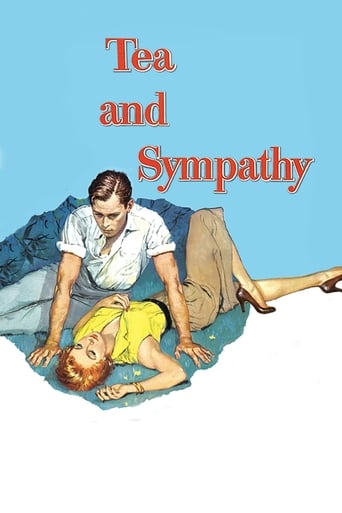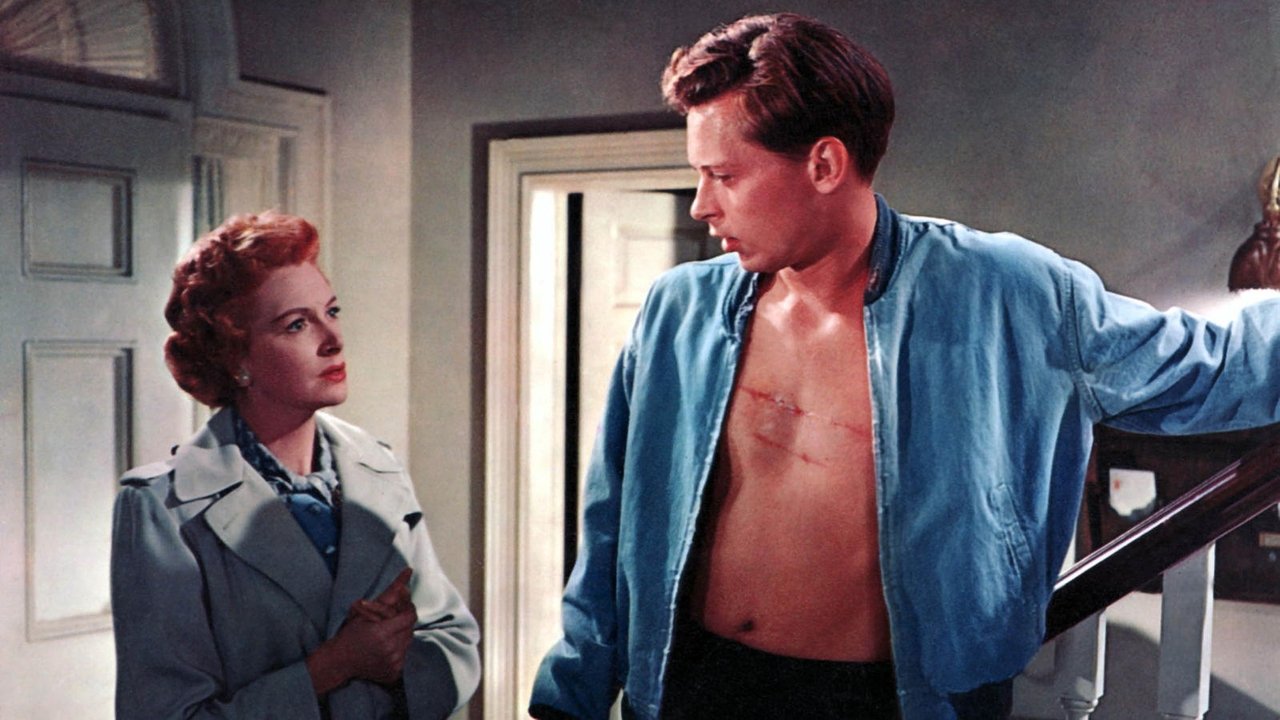vincentlynch-moonoi
The reviews here of this film are either very supportive of the film, or very dismissive of the film. I was pleased to see more that are supportive, but unfortunately there are quite a few people out there that just don't get it.In age where over a dozen states now have gay marriage, it is virtually impossible for anyone younger than -- well, let's say 50 -- to understand the time which this film depicts. Stonewall was 16 years in the future. The vast majority of gay men were totally closeted. You cannot compare the gay world of 1956 with the gay world of 2013. This film takes place in the era when men were (supposed to be) men. Many people were so dense about gay life that they couldn't conceive of Liberace being gay (and this play came about just as Liberace was coming into our living rooms every week); but few "saw" it...or wanted to see it...or wanted to admit it. So for those of you who want to put down this movie as being unrealistic...it wasn't that unrealistic in the mid-1950s. In fact, for its time, this was a rather daring film, and apparently had difficulties with the motion picture production code.It's very easy to attribute some of the film's misguidedness to the stereotypes that we see here. But, often stereotypes become so because of a degree of accuracy. The young man depicted in this film is marching to a different drummer, at a time when not many people did. The most interesting question the film brings up -- and doesn't answer -- is whether or not the young man was actually gay. It seems as if he was, or perhaps he was just not ready to take on an active heterosexual life. Perhaps he was closeted. It's ambiguous. The father's attitudes are not that off-base when you consider that the character was born not long after the turn of the last century! Get a little historical perspective. If there is one character here who is outlandish, it's probably Leif Erickson's coach-role...dripping with testosterone, when it really makes him and the other "boys" look too involved with guy-stuff. Deborah Kerr here is so good...as some have pointed out, a little stage-play-ish...but I guess that was to be expected after having played the role on Broadway for so long. In fact, there are some problems with her character...getting overly involved and overly mothering. Personally, I thought John Kerr...well, either he was overacting in some of the most psychological scenes, or he was falling back on the way one has to act on a large stage in a huge theater. Edward Andrews...well, as the father I guess he was supposed to be smarmy...and he certainly was. It was nice to see a more adult Darryl Hickman; for my money, Hickman was the finest of the child actors of the whole era, but as a young adult he wasn't as convincing.I'm glad I watched this film, but that's not to say that I didn't find it just a bit tedious. It was probably a bit overly long, coming in at over 2 hours. I can't say this was Vincente Minelli's greatest accomplishment as a director. But if you want to get a little historical perspective on the issue of gayness in the old days, this may be as good as anything else out there.
Shuggy
I read the play when I was Tom Lee's age and deeply closetted, and it had a devastating effect: "At last someone understands: just because I'm not like the others doesn't mean I'm - heaven forbid - gay." I thought the play was great - liberating, even.I saw the film (on TV, with distractions) some 25 years after it was made, myself on the brink of coming out, and noted that it was much less clear that it was about homosexuality than the play had been. Tom's sexual orientation had been blurred down to the question of whether he was "a regular guy" or not. Key speeches like Laura's challenge to Bill's sexuality were missing. And Laura's letter at the end seemed just moralistic, and an obvious sop to the censors.To see the film today, out and proud, and with the benefit of nearly 50 years of hindsight, I find myself agreeing with many of the comments above, both positive and negative. The film is hard to watch because it is so overwrought. That is easier to understand when you know that all three leads are reprising their stage roles. Even so, there is a desperate tension running right through it. With the possible exception of the faculty wives, not a single person in it is comfortable with their sexuality. The guys are, without exception, over-anxious to prove something, and Laura is frustrated. (Ellie Martin at least knows what she wants - a radio that works - and what she wants to pay to get it.) Overlaid on this, nothing can be explicit, everyone talks all the time in circumlocutions. Of course, that was the rule in films of those days, and possibly real life as well. Therein lies a contradiction that can only be resolved from outside the film and in its future, now. The film was trying to liberate people like me (and heterosexual non-conformists) while staying within the confines of a deeply closetted and homophobic film industry.Should you see this film? As a piece of gay history, perhaps. As a commentary on a homophobic time, it is instructive, both for what it says and doesn't say. As a worthwhile drama that will involve you in its issues, no. Has it anything worthwhile to say, as someone says above, about the importance of love? If you concentrate on Deborah Kerr's performance and her predicament, perhaps, but it's like watching a beautiful butterfly struggling in a pitcher-plant.
encroisade
Here we are in 2008, and the pendulum of sexual misunderstanding has swung both ways now, in a few generations. Once, homosexuality was despised. Now, increasingly, homosexuality is advocated as an enlightened preference. Propagating the human species is not a priority in what is perceived as an era of over-population. Besides, we have test tube babies today, and cloning people is probably already being practiced behind closed laboratory doors.What has remained the same in the past 40 years, however, is that people regard sex, in whatever form it takes, as the main priority of life. The pharmacies can't keep enough Viagra on the shelves."Tea and Sympathy," is only 'dated' for those people who don't realize that both the play, and the film, deal with the subject of love. Love is not sex. Sex is not love. You can have love without sex. You can have sex without love.Perhaps, in some future era of civilization, if we don't blow ourselves up first, the time will come when caring so much for another person that you are willing to sacrifice your future for him, or for her, is more than a Quixotic fantasy. Actually, this has been the cultural ideal on and off for centuries. Ancient Greece and Rome glorified sex and demeaned marriage, as our role models seem to do; and their orgy palaces fell into ruins in the dust of time. Later, in the Middle Ages, the troubadours sang of romantic, idealized love. By the 1600's, as the incredible book "Don Quixote" humorously demonstrates, chivalry was already dead, a laughing-stock, totally divorced from reality. In Victorian and Edwardian England, sexuality became schizophrenic - incredible debauchery existed side-by-side with the kind of love story personified in the lives of Robert and Elizabeth Barrett Browning, on Wimpole Street.The two World Wars of the 20th-century despoiled and degraded many lives, on a wide scale never before seen in history. The film goddesses of the Silver Screen could play a whore one week, and a nun the next. Schizophrenia continued to reign, alive-and-well.But now, we are immersed in a pornographic dream.From that standpoint, of course "Tea and Sympathy" is dated. Some commentators here on the film even go so far as to entirely make up scenes which never occur in the movie, right out of the whole cloth of their own fantasies. No, in the last scene Laura never unbuttons her cardigan; and Tom never fondles her breast. More proof that people claim to see things that don't exist simply because they expect to see them. Even 'eyewitnesses' to major news events often don't really know what they're talking about.If this is a cult film for homosexuals, it is because they see what they want to see in the movie, and not what exists. Clearly, Tom Lee is smitten with Laura long before the film starts, just as his first love was a blond schoolteacher when he was only twelve. Laura's line to his roommate: "Maybe Tom is deeply in love" could only apply to Tom's feelings toward herself.What is to be learned from Maxwell Anderson's sensitive writing, as well as from Tennessee Williams' best work, is that love is the main thing, and that we choose those whom we love because they meet our psychological and emotional needs, and many times we are not even consciously aware what those needs really are. Reynolds, for example, although he was certainly ambivalent in his sexuality, still truly wanted a good woman to be his wife, which is why he married Laura and fully loved her in his own way; but he also needed patient help right from the start, whereas Laura was slow to realize his dilemma and, being admittedly a selfish woman at times, nursed her own hurts as their relationship deteriorated, quite apart from Tom's involvement at all. Her husband ended up a broken man, not because he was a frustrated, repressed homosexual, but because he had failed the love of his life and couldn't trust himself not to do the same again with another mate.In "Tea and Sympathy", and in reactions to the film for the past decades, we see how the norms of society can entrap all of us, at both ends of the spectrum.
MarieGabrielle
This film came to audiences at a rather schizophrenic time, things were changing, but not that much. Roles were assimilated, but not too drastically. People were questioning things, as long as it wasn't radical.Women were still patronized, there were still clear role boundaries (witness the scene where Tom is knitting and catches derision for spending ten minutes in a sewing circle.) Not sure why that was a crime of the century, but whatever.Deborah Kerr is tender and memorable as an unhappy wife to the school master at a prep school who realizes her marriage is a sham. She realizes this when she sympathizes with a student and resident at her home, a confused young man who simply is shy and has doubts about his future. There are some nuances regarding sexuality, but in all honesty that was a side-story, from what I inferred.The message I take away from this film is not simply about ostracism and hatred; Minnelli as director also addresses female emotion, the reasons why Kerr empathizes with the young man, and how he eventually moves on. In the long rung, it is life affirming, although rather opaque in its message.Discrimination and hatred take many forms, and sometimes the subtler forms are most repellent. Highly recommended. 8/10.



 AD
AD



